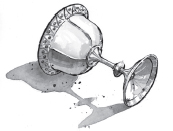

While the monk saved Patrick, the soldier had carried Beth away. He took her to a large Roman palace.
Inside, they came to a large courtyard. Beth could hear birds chirping and cooing.
The soldier dumped Beth onto the dusty ground.
“You’re not a very nice man,” Beth said, rubbing her back. She glared at the soldier.
He glared back. His eyes narrowed as she stood up.
“What’s that on your belt?” he asked. “A sack of coins?” The soldier grabbed the bag. The string didn’t break, but a little of the birdseed spilled on the ground.
“What?” he said. “Only birdseed!” He let go of the sack and looked at Beth with curiosity.
“So, you’re one of the slaves who takes care of the birds,” he said and then laughed. “No wonder you ran away. I would hate to take care of the emperor’s ‘darlings.’”
Beth didn’t understand him. She scowled and looked around.
Beautiful plants and small fountains made up a lovely garden. It was filled with birds: peacocks, chickens, and small brown sparrows. Noisy green parrots and white doves perched in the trees.
A stooped old man in a slave’s tunic was leaning over a birdbath. He was pouring water into it from a bucket.
The soldier walked over to the slave.
“This slave girl belongs here!” the soldier said. “See that she doesn’t run away again!”
The soldier turned back to Beth. “Do not leave this courtyard, or you’ll be sorry,” he said. He patted a bow that was hanging at the back of one shoulder. “I can knock a sparrow off a tree branch at twenty paces.”
“Not in front of the emperor you can’t,” the old man said, mumbling. “You know how he feels about birds.”
“Well,” the soldier said, “the emperor’s not here. I’m going to tell him I’ve found his slave. Then he may give me a reward—a large reward.”
The soldier hurried off.
The old man said, “Now I can go back to counting the feathers in the emperor’s pillow.”
He walked away slowly. He turned to look over his shoulder. “Watch out for the peacocks,” he said to Beth. “They bite.”
Beth gave the man a small wave good-bye. She looked at the ground. A red chicken ran past her feet.
“I’m not a slave,” she told the chicken. “I just look like one.”
It cocked an eye at her as if to say, “And I’m not a chicken. I just look like one.” Then it ran away.
At the far end of the courtyard, a gate opened. A young man came through. Beth thought he looked like a teenager. He began to make clucking noises. He rubbed his fingers as if calling the birds.
He walked over to her. “I’ve never seen you before,” he said. “The soldier said you were a bird slave. Are you here to feed them?”
The young man came closer. He wore a tunic. It looked as if it was made of soft white bedsheets. It had a purple stripe down the front.
“Answer me, slave,” he said.
Beth almost said no. But then she remembered the birdseed. She touched the pouch hanging on her belt.
“I have food for the birds,” she said.
“Then what are you waiting for?” he asked. He sounded annoyed.
Beth opened the pouch. She began to throw the seed to the chickens. The chickens clucked around her.
“They like your seeds,” the young man said. “Do you have a name, slave?”
“Beth,” she said.
“A common name,” he said.
Beth frowned. “Oh really?” she said. “And what is your name?”
“Honorius,” he said.
Beth put a hand over her mouth. She had to keep from giggling.
“That’s a funny name,” she said.
The young man turned bright red. He said, “You dare to laugh at your emperor?”
“Emperor!” Beth said. “You can’t be the emperor.”
There was a loud bang, and both of them turned toward the sound.
A large iron door in one of the stone walls opened. A large Roman soldier came through it.
“Your Highness!” the man said. He had a deep booming voice. He pounded a fist against his chest. Then, as the soldier came closer, he bowed. “I am at your service.”
“Greetings, General,” said Honorius. “I am glad you are here. Please put this girl in prison.”


The general looked at Beth and then back at Honorius. The general’s bushy eyebrows lifted high.
“What did you say, Your Highness?” the general asked.
“I’m sorry,” Beth said quickly. “I didn’t know you were a ‘Highness.’ I mean, you’re young.”
“Do you hear that, General?” the emperor said. “Punish her.”
The general ignored Honorius. He said, “Forgive me, O Great One. But you sent for me. I am to give you my report.”
“I did? You are?” Honorius asked.
“Yes,” the general said. “I am here to report that your army has won. The soldiers captured the barbarians. The prisoners are now in Rome.”
“Wonderful!” the young emperor said. Then he frowned. “And why is this important to me?”
“The games begin tomorrow,” the general said. “We will enjoy watching our enemies suffer and die.”
“Oh yes!” Honorius said. “But I won’t go without my birds. The birds must come with me.”
The general bowed and said, “Whatever you desire, Most High One.” He turned and walked away.
“Most High One?” Beth asked.
Honorius raised an eyebrow. “It is good that my birds like your seeds,” he said. “Or I would chain you up myself. You are a rude little girl. But today I will spare you.”
“Thank you, Your Emperor-ness,”
Beth said. And she silently thanked Mr. Whittaker for giving her the birdseed.
“Now,” Honorius said, “we must begin to gather the birds.”
“We do?” she asked. “Why?”
“You heard the general! We go to the games,” he said. “We can’t leave my darlings alone. You must collect them.”
“You’re taking me to the games?” she asked.
“I’m taking the birds to the games,” he said. “You’re coming to take care of them.”
Beth frowned and said, “But the general just said that people are going to die there.”
“Of course they will,” he said. He gave a snort. “What’s the point of a fight to the death if no one dies? Now get to work. It will take you most of the night to gather my birds.”
Beth gulped. “Most of the night ?” she asked.
“At the very least,” the emperor said.